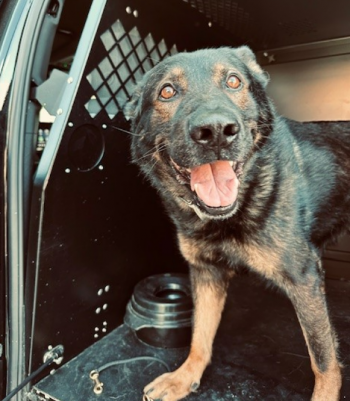When retired K9 officer Kantor came to the MSU Veterinary Medical Center (VMC), his mission had changed—but his courage hadn’t. After years of service with the Warren Police Department, the 8-year-old German Shepherd was diagnosed with lymphoma, a form of cancer affecting his lymph nodes.

Kantor’s diagnosis came just weeks into his well-earned retirement, after his handler and long-time partner Officer Nicholas Hofer noticed a lump near the German Shepherd’s throat. When Hofer brought Kantor into the Veterinary Medical Center to investigate, Dr. Alison Masyr knew that the first step would be further testing.
“It’s pretty unusual to see a dog with lymphoma in only one lymph node,” says Masyr, a board-certified veterinary oncologist in the VMC’s Medical Oncology Service. “We sampled a different lymph node that was normal in shape and size, and submitted a test to determine if there was lymphoma there as well. We found that there was, so we shifted away from a surgery to remove one lymph node and instead went the route of chemotherapy.”
Kantor started on a protocol called CHOP chemotherapy, which is also commonly used when treating people with lymphoma. The process requires multiple treatments over the course of about six months. “The VMC is an hour and a half drive from where I live, but it’s worth the trip,” says Hofer. “I was coming up here every week because I knew this was the best option for him. The doctors, nurses, and staff were so helpful through the whole process.”

While the cancer diagnosis means that Kantor’s retirement will look different from what Hofer hoped for, the treatment he received will allow him to make the most of the time he has left. “Kantor responded beautifully to treatment,” says Masyr. “It’s been a real joy to work with him.”
Throughout it all, Kantor has maintained the same personality that made him an exceptional police partner. “What made him stand out was his sociability,” says Hofer. “He always seems like he has the biggest smile on his face. We had a blast working together.” That work consisted of hundreds of deployments, during which Kantor assisted with the identification of deadly narcotics and the successful location of nearly 100 individuals.
Now, Kantor’s battle with cancer has inspired something larger: a shared sense of gratitude and purpose. Through community funding, Hofer has received over $20,000 to go toward Kantor’s treatment. For Masyr, that sense of reciprocity carries into her work as well. “It’s very nice to think about paying it forward,” she says. “Kantor fulfilled his duty, and now we have this opportunity to fulfill ours.”


